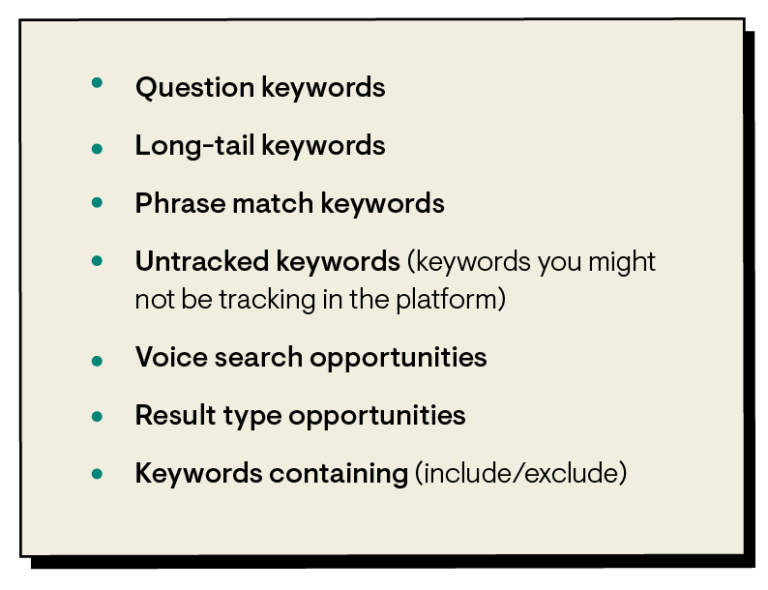Google Algorithm Update: The Importance of Semantically Related Keywords in SEO
Semantic keywords are words that relate to each other conceptually. Find out if Google’s algorithm considers them a ranking factor for SERPs.
There’s been a lot of controversy in the past over whether latent semantic indexing (LSI) is a ranking factorRanking Factor
The term “Ranking Factors” describes the criteria applied by search engines when evaluating web pages in order to compile the rankings of their search results. Ranking factors can relate to a website’s content, technical implementation, user signals, backlink profile or any other features the search engine considers relevant. Understanding ranking factors is a prerequisite for effective search engine optimization.
Learn more or not when it comes to Google’s algorithm. While there are passionate arguments for and against LSI as a ranking factor among SEO professionals, no matter where you land, incorporating semantically related keywords throughout your content is still a best practice.
Adopting and implementing a semantic keywordKeyword
A keyword is what users write into a search engine when they want to find something specific.
Learn more strategy is important to make sure your content is optimized. When creating new content, you should do keyword research and find all the relevant keywords around your target keyword to use on the page.
What is latent semantic indexing?
Latent semantic indexing is an indexing method used to find similarities or patterns between terms and concepts. In the simplest terms, semantically related keywords are words that relate to each other conceptually. It’s a mathematical technique used when search engines try to figure out the intent behind your search by putting it in relation to other related words (imagine a word cloud related to phrases you search). LSI keywords do not necessarily need to be synonyms of your target keywords, but they should be related to the topic in some way.
Why is using a variety of different keywords important in your content?
As a result of keyword stuffing in the early days of SEO, Google had a hard time providing the optimal rankingsRankings
Rankings in SEO refers to a website’s position in the search engine results page.
Learn more for searches and queries. With the use of LSI keywords, SEO experts are able to provide additional context and relevance to a searched topic, allowing Google to prioritize the highest quality of content to rank in the SERPs.
People search for the same thing in a lot of different ways. It’s important to account for this and include related keywords in your content. By using keywords that are similar to each other and have the same intent, Google has a better understanding of what the content is about.
Google wants to provide the best experience possible to users, so the more information and context you give them as it relates to your content, the better chance you have of ranking on Page 1 for the search phrases your target audience is using.
Anyone in SEO knows that Google can be less than honest (and even misleading) when it comes to the exact ranking factors that impact search results in an effort to protect the integrity of the algorithm. So even though Google claims LSI and semantic keywords don’t come into play for ranking, there’s still an ongoing debate among SEO professionals over whether this is accurate.
Either way, providing LSI keywords in your content, at the very least, helps a crawler (robot) better understand what the true topic of your content is about. After all, the end goal of your content is to help the searcher, so including LSI keywords can only help your site be found more often by the correct audience to solve the questions they are looking for.
How can you identify if your keywords are semantically related?
Identifying how relevant a keyword is to your target audience can be difficult. Relevancy is an extremely important step in keyword research. An effective strategy for finding if the keyword is semantically related is to take a step back from your company and pretend you are a customer.
What questions or words would you type in Google as a customer? What types of terms would you think are related to your content, products, or services?
When you type these keywords into Google, do your direct competitors show up? If you’re an eCommerce company and you see content aggregators or publishers showing up, then it’s probably not the right keyword to go after.
However, many times there are keywords that produce a mixed search engineSearch Engine
A search engine is a website through which users can search internet content.
Learn more result page (SERP) that include both transactional and informational websites because Google is confused around what the user might want for this query.
Another way to identify if the keyword is relevant to your target phrase is to do detailed keyword research using an enterprise SEO platform.
When using Conductor, there are a few features that can help with identifying semantically related keywords.
Using Explorer, you can do keyword research around a topic, a page, a subfolder, or even an entire domain/subdomain. These powerful insights uncover what Google believes the page is relevant for or what competitors might be ranking for. If a page is ranking for a keyword, then Google is rewarding this page as they believe it’s the most relevant for that topic.
If a top-ranking page exists already, you can find out what this page ranks for and see if there are any related keywords on Page 2+ worth optimizing around or including more frequently in the content to help improve your rank.
If the page is brand new, you can use Explorer to do keyword research around a topic. By typing in your target keyword, you can then see a list of keywords that are related to your main topic sorted by monthly search volumeSearch Volume
Search volume refers to the number of search queries for a specific keyword in search engines such as Google.
Learn more (MSV).
There are a few different ways you can further filter or segment your keywords down to identify contextually relevant ones. You can filter them out into the following buckets:

This makes the process of keyword research much easier as you can start to identify keywords that you might not have realized are related to your main topic.
Additionally, you can use Content Guidance to find out more information around what Google considers related to a given phrase and what related keywords top competitors are using within their content.
When using Content Guidance, you can better understand what is happening on Page 1 and 2 of Google’s SERPs around a specific keyword.
If the page exists, you can add the target keyword or semantically related keyword as the topic you want guidance around, along with adding the existing page in the URL field. Content Guidance will provide insights if the existing page includes this keyword in a variety of places (title tag, meta descriptionMeta Description
The meta description is one of a web page’s meta tags. With this meta information, webmasters can briefly sketch out the content and quality of a web page.
Learn more, header tags, body copy) and many other insights comparing the page to the top organic competitors.
If the page does not exist, you can still add the target keyword or semantically related keyword as the topic you want guidance around for additional insights to inform new content.
Content Guidance provides insights around what areas the top rankers are using on their landing page. You can see the breakdown of where they use these keywords and how often they use them. This can inform where to add these phrases on your own landing pages for the best opportunities to outrank the competitors.
So why are using semantically related keywords important in SEO?
Google doesn’t necessarily care about good SEO; they care about prioritizing websites with good user experienceUser Experience
User experience (or UX for short) is a term used to describe the experience a user has with a product.
Learn more (UX). Google also understands that while people may search for a given topic very differently, they often still mean the same thing.
By including semantically related keywords, you can make sure Google has a good understanding of your content. No matter how the user begins their search, they can still end up landing on your page.
Keyword research is the bread and butter of creating any new website page or optimizing a given page because you can start to identify other keywords you can target or new phrases you never thought of targeting to help improve your organic rankings.
Keep in mind that you still need to monitor all of the keywords you end up targeting to make sure that you actually rank better when using them more frequently. There are times when you try to optimize around keywords you feel are relevant, and it doesn’t end up working. Ether the intent behind the keyword changes or Google doesn’t feel your content is truly relevant for that other topic. If you don’t report consistently on this data, you won’t be able to evaluate which specific changes are working.
So, is LSI a ranking factor for Google’s algorithm? At the end of the day, it doesn’t really matter because including relevant keywords in your content will always be a good way to make sure your content is visible to as many people as possible.
Register for our next 30|30 webinar—led by SEO expert Pat Reinhart—to stay on top of the latest SEO news and evolving algorithm updates each month.







